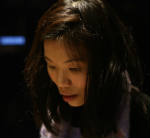Jellyfish
Queuing up at the bank,
customers watch the abyss of a blue sea
on a television suspended from the ceiling
to relieve themselves of the wait and silence:
a documentary on jellyfish,
sea jelly
dancing in cobalt depths,
blazing purple tentacles
flap like manes in a dream,
moving as a group, translucent,
expand and contract
in an elegant swim,
carried by the current.
It’s your turn, Señora.
I regret my words:
she is smiling
at the screen.
In just one move
I have pulled her up from the bottom of the ocean
to its land and taxes.
I have brought her back to herself,
her green headscarf,
back to her age, her war against time,
her thick makeup and pants.
Back to oxygen in force,
the lady walks up to the cash desk,
depths forgotten,
and pays Argentine dead waters[1]
with her personal funds.
Embalmed Fauna
is this a poem?
is being sleepless in the dark
a poem?
can there be a poem
if nothing exists?
if I say I breathe in this black cube,
isn’t it something to start with? or is it too much?
isn’t its reality much more than this?
I look for silence stilled between walls
a word of penumbra
any word but night
for night is the only one licensed
to cosmic poets
I think of its blackout as a verb
a blind mouth in the shadow of this Wednesday
I was—I wanted to be—a pastoral poet, a cosmic poet
but I am a poet of buildings
an elevator poet
who doesn’t want to sleep
I want to lie down on words in the dark
for example:
where are the hands
of this question?
how does a poem work in a dim apartment?
I who used to call night a métisse or an inky mare
where can I go?
what to do with my embalmed fauna
without an image at a quarter to midnight
but to grope sleeplessly for a verb on the sixth floor?
I sell or rent my staunch cosmogony
trade my solar system
for two words
that say all of my shadow
This Afternoon
Everything happens within the brief glow
of a large mirror.
No longer a shadow that invokes dreams
of dead horses.
Winter shines
with the afternoon leaning on sidewalks.
Light at its grave hour of high tides
floods air with its foliage in lumens,
through weather and smoke,
windows in this sleepless café.
A shadow grows from words,
seated men, empty chairs.
A bus passes:
afternoon rays traverse it
and gun down the solitudes.
Its door opens:
the sun enters with a cat that climbs onto a seat.
Barely a minute,
something vanishes like perfume.
The breakdown of fire and silence
turns this day off forever.
Translated by Fiona Sze-Lorrain
[1] This is a pun. The literal translation of agua viva [jellyfish] is “living water.” The lady is paying her bill from a water company called Aguas Argentinas. The poet adds to this company name the adjective muertas [dead], which means the opposite of vivas.



